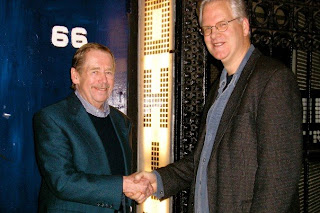Note: this post has become quite popular, so I wanted to mention that I tackle the questions of making money in theater and the arts much more in depth in my
comparison of the salaries of artists vs. non-artists. Actual statistics from a semi-scientific survey included! Read it.
I've been so preoccupied with the readings of
Rudolf II and
Golem Stories (both of which went very well, I think), that there's been no time to blog. I wonder if there will be any time during the International Festival of Jewish Theater and Ideas. We'll see...
But for the moment, back to Playing Dreidel with Judah Maccabee, which is still going on. I have a few new photos: one of a scene from the play, one of Evolve Company's shadow puppets (which occur inside the ark you can see in the first photo). The shadow puppets are a peek inside the ancient temple in Jerusalem. The man on the left is the High Priest, wearing the breastplate described in the Old Testament (a little detail that I doubt anyone at the show quite registers, but makes me happy).

One thing writing and directing the play has made me realize is that the story of Hanukkah is really about perseverance. Which I would think would not be a revelation, after all this time, but somehow is. The fun for me was in the rituals, and there was this little story about light lasting for eight days. As a friend wondered the other day - so what? What's so special about extra light? The legend of the light, actually, existed well before the events with the Maccabees, and only later were the two things put together. Why that connection?
The obvious answer, though I'd never stopped to ponder it before, is perseverance. The Maccabees should never have survived their battles, lasted as long as they did, but nonetheless they did. And of course perseverance is a theme in Judaism in general. To keep surviving, despite impossible odds. "To always be on the edge of defeat, yet never to be defeated," as I have Judah Maccabee say.
Watching the shows, I started wondering how growing up with that philosophy might have influenced my going into theater. Because theater is truly a profession with impossible odds. My friend Henry has posed the question of whether it is actually possible to make a living as a director, in today's theater. Maybe. Maybe not. But it's almost impossible. The point was driven home to me the other day when another friend, an actor, turned to me and said, with surprise, "You never expected to make money doing theater, did you? I mean, it's possible, but the likelihood is so small..."
But I did expect it. I have always expected it. Even though I wonder, still, if it's possible. When in college, when people asked me what I would be, I said "A starving artist." It was a joke that was not quite a joke. Yet underneath there was a certainty that no matter how difficult, it was possible to persevere, and overcome those odds. Was that something that came from Jewish culture, from Hanukkah, or just my own hubris?
I ask this at a point when I have become concerned about my own finances and the affect they will have on my career. I need to make more money than I'm making, and yet the career I have thrown in my lot with doesn't necessarily offer much, especially in these times. But what to do if I don't have the finances to sustain what I'm doing? Sadly, running a theater company, writing, directing, etc, is more than a full time job. I am so busy day to day that I barely have time to do what I need. I make some money at it all, but small sums.
I feel simultaneously very optimistic about my projects and very worried about how much longer I will be able to sustain myself financially. Is perseverance enough? How many days can the light stay lit?









